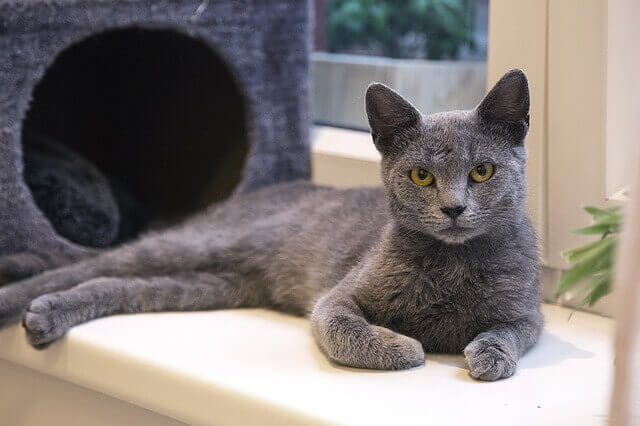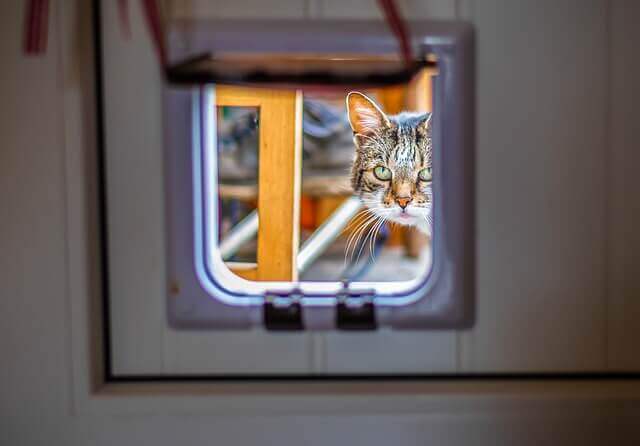Moving with cats can be a challenge due to their well-known aversion to changes in their environment. As territorial animals, they often feel most comfortable in familiar conditions. So, when it’s time to move, it’s essential to consider their well-being. With the right approach and care, your cat can adjust smoothly to the new environment, allowing you both to embark on this new chapter together.
Relocation doesn't have to be that hectic
Moving with Cats – Preparation Process
You should keep in mind that preparing your kitty for a move starts way before the big day almost as soon as you decide where to move and pick the best time of the year to move. First, you should ensure that your animal friend gets comfortable in its carrier. That is the place where it will be spending a reasonable amount of time during the move.
Since no one knows your four-legged friend better than you, you know what kind of relationship it has with a transporter. Many strongly dislike it, and if your animal is one of those, slowly adapting it to the carrier should be the start of your relation day preparation. The more your cat is frightened of the transporter, the earlier you should start this procedure.
The transporter should be placed in the room your pet usually occupies. Leave its door open and allow the cat to explore it. You can even put toys or food in there for encouragement.
Help Your Pet – Call a Vet
Cats love routine, in just the same way dogs do, so having to change their surroundings can lead to relocation depression, anxiety, and related health issues. Not only the change of scenery but the transport process itself can be stressful. There is a lot of commotion in the house. If you plan to hire professional movers, there will be many unfamiliar people inside, all of this can raise stress levels for your cat.
If you found a job before moving to another state and you’re relocating long-distance, talk to your vet before to avoid making some common moving mistakes. They might give you a medicine specific for kitties, that can help with the long ride. You should want such care for your furry friend before and during relocation day, but after it, too. The health of our pets is extremely important, after all.
Have Fun with Boxes
Your packing process will entail a significant number of boxes, no matter what is your reason to move or how many unwanted items you donated, and we all know how much those balls of fur love playing in them. Having crates around the apartment even before you start packing clothes and furniture can be beneficial for your cat. But if they start showing some signs of anxiety around boxes, try to use sprays such as Feliway, which holds pheromones that can induce a feeling of coziness.
Let your cat play with boxes
Keep up With Old Habits
Keeping stress levels low when it comes to your feline means maintaining a routine. Ensure that you don’t miss the meals and playtime even if you’re too busy house-hunting or contacting movers and choosing the relocation company. House animals value human companionship, which is why you need to provide them with affection during this hectic period.
Keeping up With the Routine Is Healthy
The time to move has finally come, but the process of making your pet feel relaxed is not over. That’s why you should keep the little friend in one room until you have loaded all the stuff into the trucks. Keep all windows and doors shut and put a note on the door so that movers don’t accidentally let it out. Keeping your pet isolated is a smart way to avoid injuries for all parties involved. Make sure that you put the carrier, bed, food, water, and litter tray in the isolated room. Not being around the hectic process of moving out is only going to do good for your little buddy, but also help you move safely.
Put a litter box in familiar space.
Cats Can Feel Your Anxiety
You made it! Everything is hauled on the truck. Now, grab a carrier and put your kitty in it. Be certain that you put the transporter in the car with you if you’re not hiring auto shipping services to transport your car across the country. Don’t keep it in the boot of the car or van. Your closeness is what keeps your fuzzy partner calm during the move.
While in transit, you should not let them out of the carrier. Remember, keeping your furry friends’ stress levels low means keeping your own on the downside. Animals like cats are good at picking up body language, so your moving stress might transfer to your little friend.
Animals can pick-up your anxiety.
Moving to a New House – Is There a Breed That Likes Traveling?
Everything is packed and loaded in the truck. All you have to do now is make sure your animal is happy and safe. This moving day will inevitably be stressful for everybody involved in the move, whether you’re relocating to the suburbs nearby or another town. But you can ease the stress for your furry friend with cuddles and additional attention.
Remember, relocation anxiety is something that can be felt all over the body, which includes the stomach as well. Feed your kitty smaller portions or put in on a diet to prevent sickness during the trip.
Cat Breeds That Like to Travel
Dealing with tension during the move might come easier if you are an owner of a breed that likes to travel. You won’t have to worry that much about anxiety if you are traveling with:
- Scottish Fold
- Japenese Bobtail
- Chartreux
- Siamese
- Persian
- Russian Blue
- Exotic Shorthair
- Abyssinian
- Ragdoll
- Maine Coon
- Bengal
- Chantilly (or Tiffany)
- Somali
Make sure you know yor kitten likes to travel
After the Transport – Let Your Cat From the Carrier
The long and tiring trip is finally over. Now you have different challenges in front of you – adjusting to a new location. You should not let the animal explore the whole place all at once. Gradually introduce it to all the rooms, even if you move into a smaller home. This will lower anxiety levels. While you are unpacking, pick a spot for your pet and put all of its things there, from food, water, toys to litter boxes. Too many novelties at once can cause your kitten to flip.
Try to keep company to your kitten when it explores the unfamiliar conditions. If the animal tries to hide in small spaces, you should know they are still frightened.
Getting Used to the New House
For animals such as felines, transiting to a completely different environment has a huge impact. That is why it is up to you as an owner to ensure the transition to life in the next home runs smoothly. Be certain that your new home is safe-proofed, and that small hiding spaces are safe. This also means that you should keep your feline inside for at least a week before letting it explore outdoors. It should be familiar with the inside of the home before going out.
Keep up with the routines you had in the old home. Food should be delivered at the same time, and portions should stay the same. Also, try to arrange your pet’s room the way it looked before relocation. Arrange furniture as similarly as possible, and put the litter box, food, and water bowls in the same or similar position. That should be right by your cat and aid her to come to terms with relocation.
Indoor Furry Roommates
Maybe you don’t want your little friend wandering around outside. Maybe you now have a place without a yard, and you need to keep your kitten inside. There are a few ways of making sure that the animal is happy being indoors:
- Keep your cat busy – organize a hunt for treats inside the house
- Buy “friendly” furniture– the one that boosts movement
- Have play sessions to keep the senses alerted
- Have secure hiding places your feline can use
With these tricks, your furry friend will come to see his room (and subsequently an entire flat) as his domain where he will feel confident. He’ll find a way to give you a sign.
Put small things in order if you want your furry friend to settle the right way.
Guide to Outdoor Exploration
When your furry friend gets familiar with the inside of your home, you can let it explore the outside world. Firstly, you should go into the yard with your little pal a couple of times. Try to chase away other animals while yours marks its territory. Keep the door open so it can go back inside swiftly if it gets scared. The open-door technique can be replaced by getting a cat flap.
When your kitten gets to explore outside, check the safety of the neighborhood, and put a collar on the cat. Keep it extra safe and get it microchipped. Tagging will help if your cat gets lost, but if it is already chipped, don’t forget to update the address. Having all the current vaccines is also a step towards increasing the safety of your animal roommate.
Let your pet explore its new surroundings.
Make Sure Your Cat Feels Related to the New Place
Sometimes, no matter how much attention you pay to your furry buddy, or how much time you spend preparing it for the change of address, anxiety is unavoidable. And if this is your first move, you can’t have a point of reference to how your feline will react to the unknown home.
When feeling stressed with the unfamiliar environment, kittens cry excessively, are aggressive, and are meowing more than usual. If you notice any signs of changed behavior in your little friends that lasts more than a week, you should contact a vet or look for advice on WebMD.
Reschedule your day, so you can socialize with your cat at home, find a more personal way to give her food, show that you care, and she will come to terms with relocation much quicker and easier. And if she discovered her next favorite box during the trip, let her have it. Another small sign of appreciation.
Cats require care just as much as a dog and will give you a sign of satisfaction
WebMD – Pets Community That Can Help You
If you are looking for help for your anxious kitty, make sure to call the vet or look for WebMD Pet advice. This is an online community that offers many helpful tips about your animal. Remember, you are not alone, many before you had to move with their furry buddies, and they had the same worries and problems as you.
You know that it takes a lot of time to prepare your cat for the move. It is a long and stressful job, especially if you’re creating a photo inventory, figuring out how to reduce relocation expenses, and moving alone to another state. Make sure that you plan your moving budget and contact a good moving company to help you with your relocation, allowing you to devote more time to your kitty.
While You Are Dealing With the Kitten Hire Cross Country Movers to Handle the Heavy Lifting
Hiring movers is often more expensive than choosing to relocate by yourself, which can seem like the cheapest way to move out of state, but it doesn’t have to be. Getting help from experienced and highly recommended cross-country movers in these stressful times is very important because they know all tips and tricks for packing quickly. You can cut the costs of moving by choosing to relocate during the cheapest time of the year.
No matter if you are moving with dogs or cats, remember that pets are more than just animals. They require special care, just like any other living beings. And kittens even more so than dogs. Create a familiar environment that they would want, starting from a single room and then step by step in the entire abode.

















